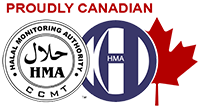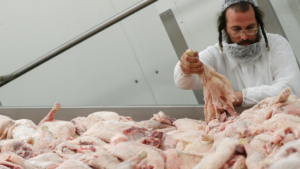The demand for Halal-certified items has gone up significantly. Companies worldwide are seeking authentic Halal certification to acquire customer confidence, grow their existing market, and improve their sales strategies to satisfy this demand. As the demand for halal products grows, many nations will need to expand their halal certification process to keep up with the industry’s rising complexity. Halal certificates are being developed by an international body to suit the needs of food and nutrition organizations and non-food organizations.The “HMA,” Halal Monitoring Authority Canada, symbol has the potential to offer previously unexplored marketing channels. Business organizations have access to the vast marketing potential of Halal customers on a worldwide basis by establishing high standards and consumer confidence in HMA. HMA accreditation also opens up the export potential to the worldwide Halal market, which comprises over 1.6 billion people.
For halal food certification, Halal Certification authorities in Canada collaborate with the ‘Food Industry’ at all levels, including halal meat and poultry suppliers, food processors, manufacturers agents, retailers, butchers, restaurants, and takeout. These Certification authorities coordinate with all parties involved in providing, trading, manufacturing, or supplying to be aware that if their product is obtained and manufactured under Islamic Shariah, there is an infinite opportunity to provide the public with guaranteed Halal assurance.
A company may get Halal Certification from many different sources. For the manufacturer, here’s a quick rundown of the Halal Certification procedure.
- Gather product information and supporting paperwork for your items. In addition, the following list of necessary papers and certificates must be presented either online or in-person:
- Description of the business
- Registration of a company or a business
- For certification, include the name and description of the product/menu.
- Name and address of the manufacturer/supplier of the ingredients
- Ingredients with a halal certificate or product specifications for essential ingredients have halal certification (if relevant)
- The material used in packing
- Procedures and processes for manufacturing
During the premise inspection, the applicant must establish a “Halal Confirmation Certificate” file to store all necessary papers for reference. why your application will reject, the following reasons are:
- The firm manufactures and distributes both halal and non-halal goods.
- The product isn’t halal.
- A natural material that has not been processed in any way.
- Products that have been processed and produced in another country.
- Products labelled with perplexing terminologies, such as “bak kut the” and similar terms.
- Fertilizers and feed for animals.
- Fill out an application for Halal Certification and pay the required fees.
- Wait for the auditors to get in touch with you.
- Make sure your storage, preparation, packaging, and completed items in storage locations all follow Halal guidelines.
- Auditors will come to your site and inspect it. They will create a report with suggestions/recommendations for your operations and facilities after the examination.
- The Halal certification panel will review your information. An agreement will be created if the requirements are met.
- Qualifying items will receive a Halal certification after signing the agreement and paying extra costs.
- . The Halal label can then apply to the items that meet the requirements.
Once the certification process completes, the monitoring authority will list the company on the authority website and social media. A sign is usually put on the package to tell consumers when a product is certified halal. HMA Canada, for example, pairs its symbol with the term halal, which means “good for Muslims. All Muslims would universally accept HMA certified products due to the strict criteria adopted in its certification procedures, including manual non-stunned or monitored slaughtering. Accreditation and certification are granted while ensuring the confidentiality of firm trade and product details. “Halal-certifying agencies also employ various symbols, such as an Arabic letter, Arabic calligraphy for the phrase halal, or the actual word “halal.”
In conclusion, there are several chances to get into the 1.6 billion-strong worldwide halal food industry:
- The halal logo serves as authoritative, impartial, and trustworthy proof of halal food claims.
- It generates a 100% profit from increased market share, with no loss of non-Muslim markets or consumers.
- Halal certification improves product marketability in Muslim countries/markets and involves a low-cost investment compared to multiple revenue gains.
- The halal product’s image is enhanced to satisfy a wide range of consumer requirements.
So to get certified in Canada, HMA Canada is the best option. We will help you throughout the certification process. HMA can assist you in selecting the best Halal certification service agreement for your company and tailoring it to your specific products and industry. It serves as a one-stop shop for Halal Certification. We have the knowledge, credibility, and trained staff to meet all of your Halal certification needs. We can certify anything that complies with Halal standards, including Halal meat taste and ingredients. So feel free to contact us. Our professionals will contact you soon.



